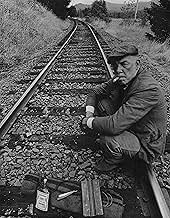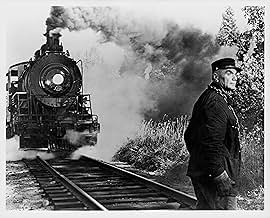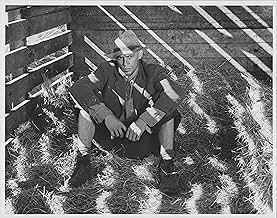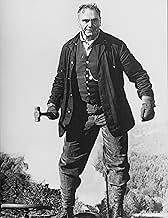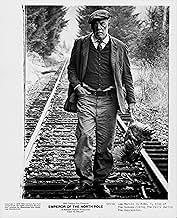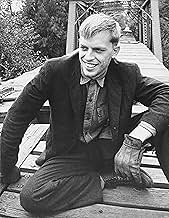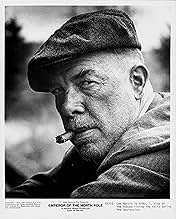Adicionar um enredo no seu idiomaIn 1933, during the Depression, Shack the brutal conductor of the number 19 train has a personal vendetta against the best train hopping hobo tramp in the Northwest, A No. 1.In 1933, during the Depression, Shack the brutal conductor of the number 19 train has a personal vendetta against the best train hopping hobo tramp in the Northwest, A No. 1.In 1933, during the Depression, Shack the brutal conductor of the number 19 train has a personal vendetta against the best train hopping hobo tramp in the Northwest, A No. 1.
- Direção
- Roteiristas
- Artistas
- Gray Cat
- (as Elisha Cook)
- Dinger
- (as Joe di Reda)
- Fakir
- (as James Goodwin)
- Preacher
- (as Ray Guth)
- Direção
- Roteiristas
- Elenco e equipe completos
- Produção, bilheteria e muito mais no IMDbPro
Avaliações em destaque
Tough hobo Lee Marvin & sadistic conductor Ernest Borgnine meet in the fight of the century , both of whom give excellent performances . Emperor of the North Pole depicts a microcosm of this subculture set in Oregon, and actually used the Oregon, Pacific & Eastern railroad which was taken up in 1994 like so much other trackage around the country. Thus, this motion picture serves as not only a look into an important aspect of American history, but into a specific piece of it in the Pacific Northwest . Interesting and tense screenplay is based in part on the books 'The Road' by Jack London and 'From Coast to Coast with Jack London' . It was Robert Aldrich's intention that the characters played by Ernest Borgnine, Lee Marvin and Keith Carradine represented the Establishment, the Anti-Establishment and the Youth of Today respectively . Nice cinematography by Joseph Biroc reflecting appropriately the 3os and Great Depression , being stunningly filmed in Oregon. Lively and evocative musical score by Frank De Vol , Aldrich's usual, including a wonderful song by Marty Robbins .
Martin Ritt was originally slated to direct but was fired from the production , then Sam Peckinpah was approached next but he couldn't agree with the producers on money. The project was then offered to, and accepted by, Robert Aldrich who gave a tense and brilliant direction . Aldrich began writing and directing for TV series in the early 1950s, and directed his first feature in 1953 (Big Leaguer ,1953). Soon thereafter he established his own production company and produced most of his own films, collaborating in the writing of many of them . Directed in a considerable plethora of genres but almost all of his films contained a subversive undertone . He was an expert on warlike (Dirty Dozen , The Angry Hills , Attack , Ten seconds to hell) and Western (The Frisko kid , Ulzana's raid, Apache , Veracruz , The last sunset) . Raing : Above average , it's a must see and a standout in its genre
The Emperor Of the North Pole is more character study than story. Marvin's character of A-1 is independent, shrewd and ethically minded, with a great sense of style. For him, being a hobo is almost a calling, and his acceptance by his fellow tramps constitutes a kind of knighthood, a status he guards jeaously. His opposite number, Shack, is a sadistic company man who relishes lording over others with a big stick, sometimes literally. To call him a type A personality would be a gross understatement. Unlike A-1, Shack has no sense of style; indeed, he doesn't even seem to own his personality. The railroad does. Cigaret is a kid, with a big ego and even bigger mouth who loves to tell stories about his exploits, none of them true. He fools no one, least of all A-1, who tries to teach him a thing or two, with only middling success. The clashing of these three personalities constitutes the bulk of the film, and is basically what it is about.
I sense that Aldrich, and screenwriter Christopher Knopf, were aiming for a larger than life effect, and that they were trying to create a sort of Great American Myth, like Paul Bunyan or Johnny Appleseed. They only partially succeed at this. Though Knopf's dialogue is at times excellent, the movie's realism works against its mythic qualities, and there's too much swearing. There's too much of a weary, real life-battered aspect to the characters for them to rise to iconic stature. Also, Cigaret's volubility is often obnoxious, and he seems to be saying the same things, again and again; and though Carradine plays him well enough, he comes across as too middle class and at times too delicate for the role. The action scenes on the other hand, are brilliantly done, and the climactic fight at the end is well worth the wait.
Set during the depression when riding the rails was a way of life for desperate men (and women), the film follows three characters - Lee Marvin, as Number One, a legend among the grizzled hobos congregating along the rail lines; Ernest Borgnine as Shack, the sadistic conductor perfectly willing to do whatever necessary to keep free loaders off his trains; and a young Keith Carradine as Two-Bit, a novice full of bluster and false bravado out to make a name for himself. Marvin takes the kid under his wing; their relationship is part adversarial, as the weary elder tries to educate the fool how to survive on the line. Looming in the background is Borgnine, out to do his job at any cost. Ultimately a wager is made, and Marvin will put his life on the line to best Borgnine and show he is the Emperor of the North.
At times it's a very brutal film - the final confrontation between Marvin & Borgnine is one of the toughest, nastiest fights ever photographed - but it is splendidly made and endlessly fascinating.
I was just a teenager when this movie was released in theatres. (There were no DVD's or VHS home releases back then). I caught just a few brief commercial promos on TV advertising "Emperor of the North Pole" and from that moment, I was hooked and had to see it. Then, in the flash of a weekend passing it was gone, yanked from the schedule at the local theatre. Perhaps it was considered too brutish in its violence or perhaps the misleading title "Emperor of the North Pole" kept audiences out of the theatre. There was further confusion for years afterwards when the reissue title came out as "Emperor of the North".
I never did get to see it way back when, but it stayed in my memory and thankfully in the era of satellite dishes and 24 hour movie channels, it lives again for the world to see in all its glory.
For those who love steam engine trains, this movie, (along with "The Train" and "Danger Lights") is an absolute must see. Director Robert Aldrich having completed the acclaimed and commercially successful "The Dirty Dozen" just 6 years earlier had the resources, the artistic courage, and the benefit of working with two veteran Dirty Dozen actors (Lee Marvin & Ernest Borgnine)who just lock-on to their respective characters with perfection.
The casting of this movie, (especially the minor roles of all the bo's and the railroad men) is superb. The cinematography is also fantastic and not only captures the beauty of Oregon, but a sense of the time and place of a depression-era story. Even the changing Oregon weather (alternating rainy-foggy days, with bright sunshine, is depicted accurately). The viewer can actually feel the cold of the soaking rain as the two hobos ride the passenger car. The frequent violence is brutal but a necessary part of the tale.
As for the story itself, the hobo's speak their own language in a kind of closed-society lyrical tongue that seems to be partially inspired by the depression era paintings of Thomas Hart Benton. It's not Shakespeare, but half the fun is trying to figure out what they are saying.
The music track, although it mostly works for the movie, seems oddly out-of-place with the period depicted, as it has a definite 1960's elevator-beautiful music component, at times. Not that this takes away anything from the movie, however. Similar, out-of-the-era music exists in great movies like, The Sting, Butch Cassidy and the Sundance Kid, and Ryan's Daughter.
Even the effects soundtrack is a masterpiece of tight editing that greatly adds to the enjoyment of the movie. Listen to the whistle blowing of the opposing "mail train" slowly growing in intensity during the scene where the two trains are highballing it to a full head-on crash. Certainly one of the most frightening moments of any "train" picture. This is film-making at its best.
Also appreciated... a subtle moment when a passenger train is pulling into the station and the viewer hears (but does not see) what might be typical comments from the passengers from a 1930's-era train. "The train only stops for a few minutes"..."I think I'll buy a newspaper", etc.
Emperor of the North Pole is great movie and an absolute must see if you are a fan of vintage railroading, Lee Marvin, Ernest Borgnine, Robert Aldrich, or Keith Carradine. You won't be disappointed!
Você sabia?
- CuriosidadesThe title refers to a joke among hobos during the Great Depression that the world's best hobo was Emperor of the North Pole, a way of poking fun at their own desperate situation since somebody ruling over the North Pole would be ruling over a wasteland.
- Erros de gravaçãoThe switch is not thrown for the mail express train to pass by Shack's train as it just enters the junction. In those days, not having the switch thrown would have derailed the mail train.
- Citações
A no. 1: [At the end of the movie, A No. 1 throws Cigaret off of the train, into a pond, and shouts to him from the train] Hey kid you got no class. Hit the bums, kid. Run like the devil. Get a tin can and take up mooching. Knock on back doors for a nickel.
A no. 1: Tell them your story. Make 'em weep. You could have been a meat-eater, kid. But you didn't listen to me when I laid it down.
A no. 1: Stay off the tracks. Forget it. Its a bum's world for a bum. You'll never be Emperor of the North Pole, kid. You had the juice, kid, but not the heart and they go together. You're all gas and no feel, and nobody can teach you that, not even A-No.1. So stay off the train, she'll throw you under for sure. Remember me for that. So long, kid.
- Versões alternativasOriginally premiered as "Emperor of the North Pole": the film was pulled from release because people thought the film was about the Arctic. It was re-released as "Emperor of the North" and given two different advertising campaigns: one with a poster playing up the comedy, another with a poster playing up the violence (The poster said "If you can ride Shack's train and live, you're...Emperor of the North!"). Neither new campaign clicked with audiences. The song "A Man and a Train" is sung in "Emperor of the North" by Marty Robbins. The poster for the original release says it is sung by Bill Medley. It is unknown what other changes, if any, were made between the two releases.
Principais escolhas
- How long is Emperor of the North?Fornecido pela Alexa
Detalhes
Bilheteria
- Orçamento
- US$ 3.705.000 (estimativa)
- Tempo de duração1 hora 58 minutos
- Cor
- Proporção
- 1.85 : 1
Contribua para esta página



